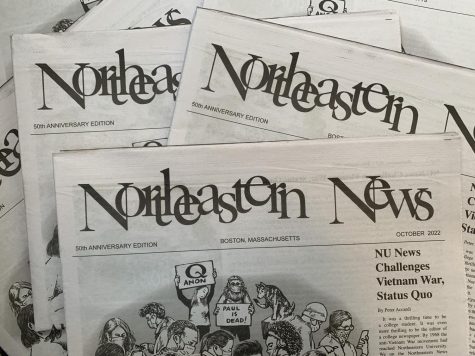What was the Northeastern News’ role 50 years ago?
October 28, 2022
The Northeastern News, as it was known then, was radically different from today’s Huntington News. It was still school supported, published in print every week and worked out of the student center.
While Northeastern as a whole was largely conservative, the staff of the newspaper was much more liberal, Barth said. They covered issues important to them, and the one-time features editor said the staff felt a sort of calling to do so.
“A lot of people took really bold steps. It was important to have The News go forward,” Barth said. “It was not, it was not easy. It was a difficult time, but we were empowered. We felt we were the vanguard, we were the youth.”
The News had no shortage of topics to cover. From the usual Mayor of Huntington Avenue to stories about riots and protests on Hemenway Street, they ran the gamut.
“It was a very tumultuous time. It was probably the most exciting time, either good or bad, to be on a college campus where you really had the freedom, within parameters of course, to write about what was going on,” Barth said.
In 1970 specifically, Barth remembers classes taking a backseat. Classes were pass/fail because of the widespread war protests and she said many of the newspaper’s staff didn’t go to classes anymore, instead staying and working in The News’ offices on the top floor of the student center.
The paper was usually published weekly, but at times the frequency increased to respond to the important stories of the day.
“We went daily at one point during the moratorium right after Kent State, when all these universities were gonna shut down. … We had a 14- to 16-page paper that went out daily and included photography and everything. I didn’t even go to class,” MacPherson said.

Among all the other issues The News was covering, birth control and abortion made at least an occasional appearance. At one point, at an editorial meeting, the staff decided not to run an ad related to abortion.
“I was not the editor, but I remember it being brought up at an editorial meeting and people decided it wasn’t worth it because it wasn’t an issue on campus,” MacPherson said. “People were too involved in other things. The ad that was finally run was probably one column inch by two column inches. I think it was a little tiny ad.”
As far as she remembers, the ad was for a clinic in Brookline that had opened previously to give out birth control and information. Since the passage of Roe, abortions were legal and the ad had a small mention to abortion, MacPherson said.
After the paper ran it, MacPherson said she remembers getting a call from the president’s office.
“They said that ‘did I know there was a rule against running the ads,’ and I said, ‘I believe the rule had to do with the fact that it was illegal to have an abortion but since Roe v. Wade passed, wasn’t it now legal.’ … And they said, ‘Well, the university is really opposed to this, and has been, we could take your papers back,’” MacPherson said. “We all kind of looked at each other, it was just an idle threat. We had heard the threat before. That was always what the university held over The News.”
Under the jurisdiction of Northeastern, the Northeastern News received funding and office space from the school. The paper also had an adviser, and those who spoke with The News said the adviser stayed out of content issues but was a great advocate for the paper.
Gelinas said that the staff of The News felt the work they were doing was important.
“At that point, because I believed I wanted to be a journalist, it just felt really like an important job,” Gelinas said. “I think there was a sense we are all part of something bigger than ourselves. Which I think it is an important part of what the Northeastern News then did, that we were a part of something bigger that was important.”
Across all the editors who spoke with The News, one thing remained consistent: Northeastern News was the center of their lives and the staff was like a family.
“The News became our lives. The News truly did become the central part of my college experience,” Barth said. “It became a real family. There was not a time that we were not at The News. Weekends we would maybe go someplace to get together to discuss because there was so much to discuss — where to go, what to do with, how to handle, and to whom we should speak. … It really was probably the most pivotal point in my college career.”
